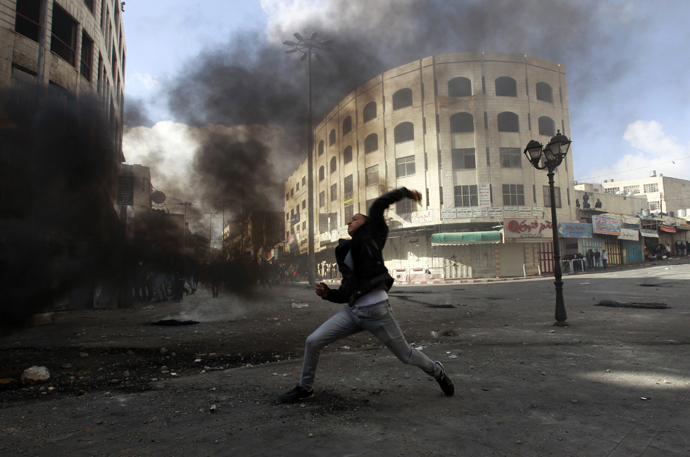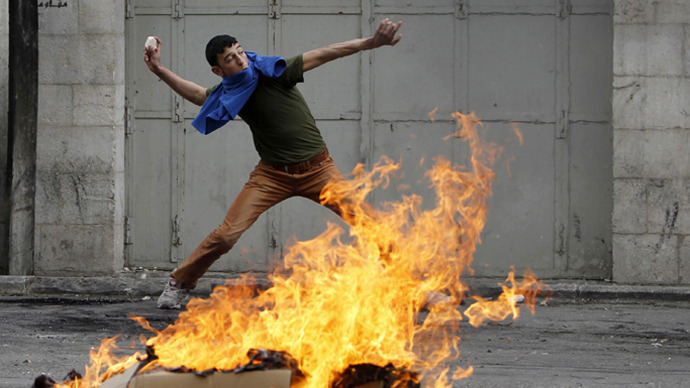Israel has sent an “unequivocal demand” to the Palestinian Authority to reduce tensions after thousands of detainees staged hunger strikes in Israeli prisons and violent protests erupted in the West Bank following the death of an inmate.
"Israel has conveyed to the Palestinian Authority (PA) an unequivocal demand to calm the territory," Reuters cites the Israeli government as saying.
The official added the message was delivered to the PA by one of Prime Minister Benjamin Netanyahu's top aides.
Netanyahu also put forward an apparent incentive to the PA by promising to go ahead with the transfer of some $100 million in tax revenues which Israel collects on Palestine’s behalf, but had been withholding.
"In order that the non-payment of taxes that Israel collects for the Palestinians should not serve as an excuse for the Palestinian Authority not to calm the territory, Netanyahu instructed the money for January to be transferred," a government statement read.
A senior aide to Palestinian President Mahmoud Abbas, was not forthcoming on how the PA would react to the demand, though he blamed Israel for the recent surge in violence.
Israeli Defense Forces (IDF) were placed on high alert in the West Bank and east Jerusalem following clashes, which erupted after Arafat Jaradat, a 30-year-old Palestinian inmate, reportedly died of a cardiac arrest on Saturday in Megiddo prison.

Israel’s internal intelligence service, Shin Bet, said Jaradat had been arrested on Monday for his involvement in a stone-throwing incident last November in which one IDF soldier was injured.
The Palestinian Authority (PA) holds Israeli officials responsible for Jaradat's death.
"This is not an isolated case. This is the case of the rights of all the prisoners - rights that are being violated by the occupation. This requires quick action to open Israeli prisons to the world," said PA Minister for Prison Affairs Issa Qaraqaa.
"Our information was that Jaradat was being interrogated and then he died. Therefore we call for an international investigation into his death, that may have resulted from torture," Qaraqaa continued.
Following the autopsy of Jaradat in Israel on Sunday, Saber Aloul, chief pathologist of the Palestinian Authority who was present at the procedure, said marks on Jaradat's body showed he had been tortured during his interrogation, Haaretz reports. Aloul further said there were no signs of heart failure.
"There were marks of torture on the back, marks of torture on
the chest, a deep wound on the upper side of the shoulder, wounds
alongside the spine and marks of torture underneath the skin,"
Qaraqaa said citing the Palestinian doctor's basic
findings.
Israel's Health Ministry said it was not yet possible to
determine the cause of death, and no signs of injury were
discovered with the the exception of those received during the
admission of CPR and scuff marks.
Hundreds of Palestinian protesters clashed with Israeli soldiers in the West Bank city of Hebron and nearby villages on Sunday.
Some 200 Palestinians hurled stones and set tires ablaze in central Hebron, as IDF troops responded with rubber bullets.
Sources in Ramallah also said the 15-year-old son of a Palestinian security services chief was wounded by IDF gunfire in a protest near the Beitounia Crossing, Haaretz reports. Another 20-year-old protester was also wounded by live fire, the sources say.
More than 4,500 prisoners also held a one-day fast on Sunday to protest Jaradat’s death.
Four other Palestinian prisoners are in the midst of a hunger strike which has already inspired a wave of violent protests in the West Bank over the past week.
Palestinian leaders have warned that the death of any of the four hunger strikers could spark a wave of unrest which might be beyond their power to control.

